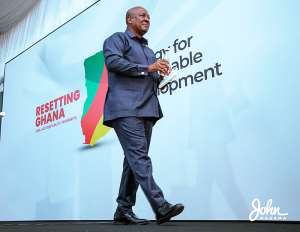
Introduction
In an era defined by high public distrust, political fatigue, and economic instability, President John Dramani Mahama’s 120-day social contract presents a compelling case for what governance in Ghana can and should look like. This analysis seeks to reflect on the concrete actions taken within this initial period of his presidency and argues that they surpass the achievements of any previous government within the same time frame in Ghana’s Fourth Republic.
Lean and Ethical Government Formation
President Mahama’s first act was symbolic yet profound, forming the leanest government in the history of the Fourth Republic. With only 56 ministers and deputies, his administration has begun a shift away from political patronage toward efficiency. His rapid appointment and approval of cabinet ministers within 14 days laid the foundation for swift policy execution. More importantly, the introduction of a comprehensive and enforceable Code of Conduct for government appointees signals a shift toward ethical leadership.
Fiscal Responsibility and Economic Reform
Perhaps the most impactful element of his early tenure is the National Economic Dialogue. By convening stakeholders across sectors and initiating immediate reforms, including amending the Public Financial Management Act to impose debt and fiscal rules, Mahama is not only complying with IMF conditions but going further to institutionalize macroeconomic discipline. These reforms, including the establishment of an Independent Fiscal Council, have already begun to stabilize the cedi and bring inflation under control.
Tax Relief and Pro-Business Environment
Unlike previous governments that relied on tax hikes and loans, Mahama repealed nuisance taxes like the e-levy, emissions tax, and betting tax within the first 90 days. The repeal of these taxes, combined with broader income tax and VAT reforms, signals a dramatic reversal from the over taxation that burdened businesses and individuals under the prior administration.
Industrial Transformation and 24-Hour Economy
Mahama’s commitment to industrial transformation is crystallized in the operationalization of the 24-Hour Economy policy. Unlike mere campaign rhetoric, this policy has already taken flight with 24/7 operations at DVLA, GIPC, passport offices, and state printers. The Youth Employment Agency’s plan to attach 20,000 graduates and deploy 23,000 security personnel is an audacious step toward job creation, far surpassing the jobless growth rhetoric that characterized the recent past.
Social Interventions and Equity
Social interventions have also taken centre stage. The Mahama Cares initiative, providing financial support to patients with chronic diseases, and the reintroduction of free sanitary pad distribution to girls are both health and gender equity triumphs. The policy of free tertiary education for persons with disabilities further illustrates an administration grounded in inclusion.
Environmental Protection and Sustainability
On environmental protection, the ban on mining in forest reserves, launch of the Tree for Life reforestation initiative, and the Blue Water project to restore rivers indicate a long-term vision that balances development with sustainability. The passage of LI 2462 to legally bar mining in forest reserves is unprecedented.
Accountability and Governance Reforms
Governance reforms have also been robust. Investigations into unresolved murders, financial scandals, and corruption in state-owned enterprises are underway. Mahama has not only initiated these probes but has backed them with real accountability measures, including legal amendments and sanctions.
Equity, Exports, and Institutional Reforms
The launch of the Women’s Development Bank and reforms to streamline government scholarships underscore his administration’s commitment to equity and meritocracy. The introduction of an export development advisory committee to triple Ghana’s non-traditional exports also indicates a strategy for external sector transformation.
Historical Comparisons: A Benchmark Against the Fourth Republic
To understand the significance of Mahama’s 120-day performance, it is instructive to reflect on the initial trajectories of his predecessors. President John Agyekum Kufuor, upon assuming office in 2001, prioritized macroeconomic stability and debt forgiveness under the HIPC initiative. While he laid a foundation for public sector reform, many of his hallmark achievements, such as the NHIS and capitation grants, came later in his tenure.
President John Evans Atta Mills, known for his calm demeanour and legal scholarship, adopted a cautious and measured approach in his early months. His administration focused on continuity and institutional consolidation but lacked the immediacy of sweeping reforms seen in Mahama’s current term.
President Nana Akufo-Addo entered office in 2017 with high expectations and a bold promise of Free SHS, which he swiftly launched. However, his first 120 days were also characterized by a bloated ministerial list and the early signs of over-centralization. Over time, his government would become mired in allegations of corruption, over-borrowing, and fiscal recklessness, as evidenced by the ballooning public debt and loss of investor confidence.
In contrast, Mahama’s return to office has seen not only urgency but precision targeted reforms, immediate legislation, and tangible reliefs. His decisions in these first 120 days have spanned structural economic change, governance reform, social equity, and institutional accountability.
Conclusion: A New Standard for Governance
When compared to previous administrations, including the early days of the Mills, Kufuor, and Akufo-Addo governments, none have matched the policy depth, legislative agility, and ethical clarity exhibited by Mahama in these first 120 days. President Kufuor focused on stability and debt relief, Mills on continuity and restraint, and Akufo-Addo on political dominance. Mahama, by contrast, is focused on institutional renewal.
This is not to romanticize governance but to underscore what is possible when political will aligns with national interest. Ghana’s democracy may be fragile, but these 120 days prove that transformative governance is not only possible, it is happening.
In a republic weary from broken promises, Mahama’s early achievements offer more than hope. They mark the beginning of a serious attempt to reset the state, and to some extent he is a soldier in the image of ‘’Traore’’ in civilian clothes. Let the next 120 days build on this momentum.
By: Kennedy Opoku
NDC-Dome-Kwabenya Global 2A Communication Officer, Political Activist, and Vice President of Solids for JDM


